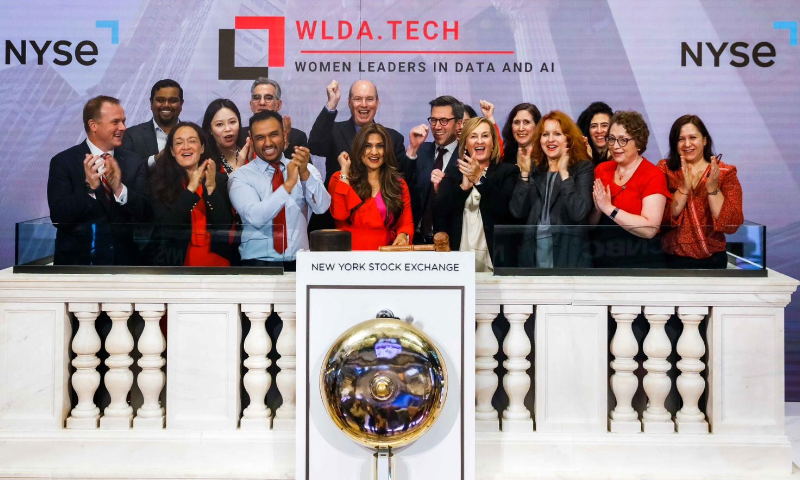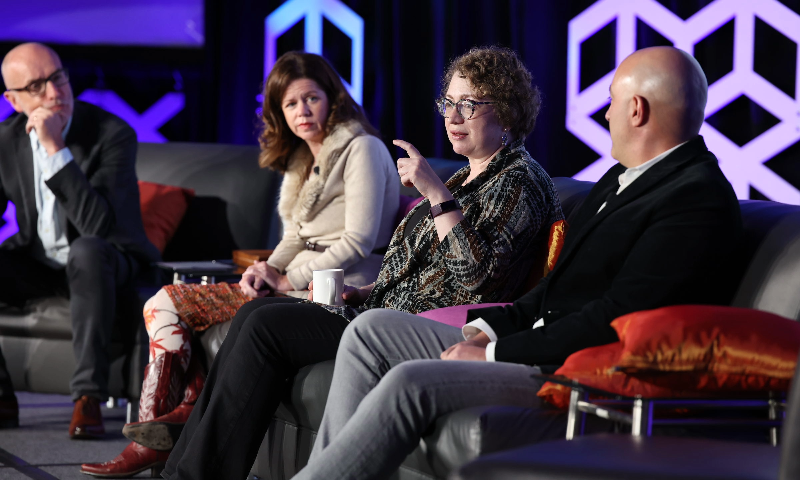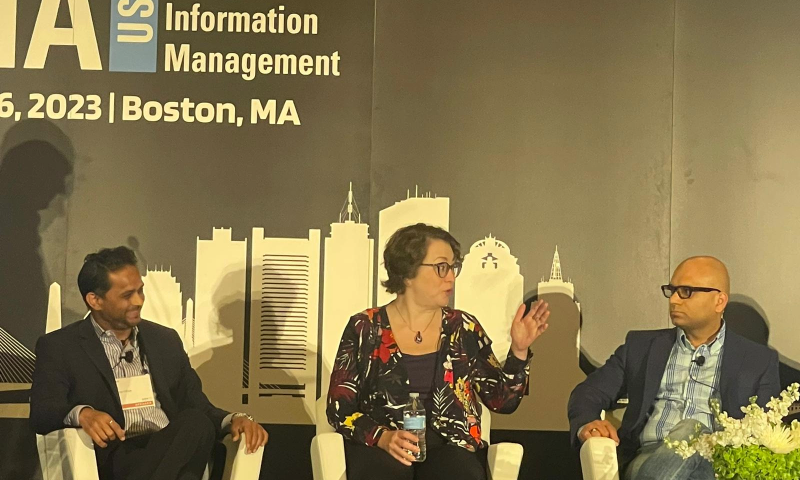Julia Bardmesser is Founder & CEO of Data4Real, LLC and a Board Advisor to several fintech startups. She has over 25 years of experience in building technology and business capabilities that enable business growth, innovation, and agility. Julia has led transformational initiatives as Head of Data and Architecture at Voya Financial, and as a senior executive at Deutsche Bank, Citi, FINRA, and others. Her recent awards include Engatica 2023 list of World’s Top 200 Business and Technology Innovators; a 2022 WLDA Changemaker in AI award; and CDO Magazine’s List of Global Data Power Women three years in a row.
Recently, in an exclusive interview with Digital First Magazine, Julia shared her insights on the impact of AI on data science, the inspiration behind establishing her company, Data4Real, the top 3 skills required to become a successful entrepreneur, personal role model, her favorite entrepreneurship quote, future plans, pearls of wisdom, and much more. The following excerpts are taken from the interview.
Do you think that data science is perceived to be more important than ever before? And what has been the impact of AI on data science?
It is definitely perceived to be more important than ever, especially since the consumer facing AI “magic” in ChatGPT burst on the scene last year. Generative AI has added a significant new set of tools to an already powerful ML/DL toolset that have been available for a while now. The major advantages of AI/ML enabled tools are twofold:
- They power up advanced analytics for companies to leverage to achieve their goals.
- When used in data management tools, AI/ML can meaningfully automate the tasks that currently require deep subject matter expertise. These experts are always in high demand but in short supply, so AI/ML tools that can intelligently infer their expertise from available information accelerate the effective use of data across the enterprise.
The major new capability generative AI (at its current state of maturity and going beyond productivity enhancements) brings for enterprises is its ability to create structured and usable data from documents. This is something companies have struggled with, and previous versions of Natural Language Processing tools were either too generic to be useful or too specific to be cost effective. Generative AI overcomes these limitations.
Julia, briefly tell us the start-up story behind Data4Real? Where did the idea come from and what exactly does it do?
Today, Chief Data Officers are stuck between a rock and a hard place.
70% of digital transformations fail – what if we see that same result with AI strategies?
Do we have the data capabilities to execute on AI?
How do we realise the full business impact of data before time runs out?
Answering the tough questions and creating an integrated data & business synergy is what I help my clients do.
I do it based on the successes I’ve experienced and the failures I’ve learned from in more than 25 years I’ve spent leading transformation in large financial companies. I always focused on creating value from data, analytics, and technology, and I put all this expertise in the service to my clients’ goals.

You are a Chair of Technology Advisory Council at Women Leaders In Data & AI (WLDA). Can you please tell us about this exclusive network and its mission?
I was privileged to be one of the founding members of WLDA. Asha Saxena (WLDA Founder and CEO) and I met at a conference in Columbia University. She was moderating a panel, and I was the only woman panelist on it. We became friends and when in May of 2020, she called me with the idea of starting WLDA, I was all in.
The mission of WLDA is to bring senior leaders in Tech, Data and AI together and help create a fair digital world with parity and equity. WLDA is a community that focuses on supporting its members through building authentic connections through peer-to-peer mentorship and experience sharing and by creating a truly supporting and empowering community.
In your opinion, what are the biggest challenges faced by women in tech that aren’t typically faced by their male counterparts? What would you suggest to address this?
I believe the widespread implicit bias that women just aren’t as good at tech as men is the biggest challenge women in tech face.
Consider that it wasn’t so very long ago when Larry Summers (then Harvard University president) posited that one of the reasons for the lack of representation of women in high level positions in science was their lack of “intrinsic aptitude”. While now, almost 18 years later, perhaps no one would say something like this publicly, it’s still a widely held belief, implicit for many and explicit for a lot more people than we would like.
There is no one magic way to fix this, but there are things companies, media and society can do to keep making progress. Here are some examples of what can be done:
- Ongoing implicit bias training in workplaces, schools, and colleges to create self-awareness and give people tools to recognize their biases so they can stop themselves from acting on them.
- Building a continuing public awareness by bringing the stories of women in science and tech and stories of the obstacles these women faced on their path.
- Alleviating the burdens of child and elder care that still disproportionately fall on women.
Going back to the first question of AI impact, this is the area where I am deeply concerned about the extensive use of AI. After all, AI models used in a hiring process are trained on the decisions that have been made by humans and those decisions reflect the biases humans have. In the currently wide-ranging debates on AI regulations, I would like to see more attention paid to the uses of AI in any type of decision making that impacts human life and career.

What would you say are the top 3 skills needed to be a successful entrepreneur?
Mindful risk taking, self-discipline and self-awareness.
The first one is fairly obvious, there is no entrepreneurship without risk taking, but it needs to be tempered by ongoing analysis and risk mitigation actions.
Self-discipline is hugely important, since there is no corporation and no boss to give direction, create yearly objectives and enforce timelines and hours.
Self-awareness is important for much the same reason: there is no one whose job it is to give you feedback in an easy to digest, non-ego deflating phrasing. You need to constantly and ruthlessly analyze the often-indirect messages from your clients, partners and vendors and keep improving, trying out new things and innovating.
What is your favorite entrepreneurship quote?
“Twenty years from now you will be more disappointed by the things that you didn’t do than by the ones you did do.” — Mark Twain
What books, podcasts, or people have been the most influential on your journey?
My grandmother, Tatyana Kosolapova, was the biggest influence in my life. She was a scientist, leading a large team in the premier material science research institute in Kyiv in the 1970s and 1980s. She also wrote scientific books, travelled broadly to speak at conferences and minted many a Ph.D. She taught me to not be afraid and to ignore people who tell me that something isn’t possible. Every time I start thinking that I can’t do something, I think of her, of everything she’s achieved against all odds and tell myself: “if she could do what she did, I can do this, I don’t have half as many obstacles on my path”.
In books, I am a huge fan of all of Malcolm Gladwell writing. His “Blink” is probably the book that has influenced me the most as a leader, making me aware of implicit biases and their implications both in personal and professional life.

What’s a leadership lesson that you’ve learnt that’s unique to being a female leader?
Paying it forward. There aren’t enough female leaders in this world, and I see it as my privilege to do everything I can to change it, by supporting and mentoring next generation of leaders, and by supporting and encouraging allyship.
Where do you see yourself in the next 5 years?
You know, I have never had a 5-year plan! Life is too unpredictable for that, and plans have a way of going stale about five minutes after they are formed. I start with what’s important to me: being good to people in my life, doing work that gives me joy and brings value, paying it forward and being open to serendipity and change. Let’s talk again in five years and see what journey this approach has taken me on.
Please share a few tips and advice on finding investors & funding for new start-ups.
My main advice for a new start-up is to first figure out what your minimal viable product (MVP) is and then build it as quickly as you can without getting distracted by new shiny objects. Get to market, learn, iterate, learn and iterate some more and get to revenue. Investors like revenue! They also like disciplined founders who aren’t afraid to fail and learn fast. There is no magic, unfortunately, however much as a founder of my own company I may wish there was!






